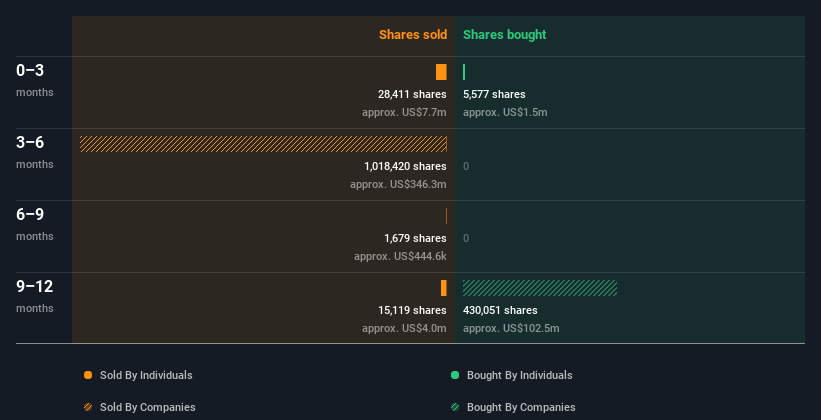We wouldn't blame Salesforce, Inc. (NYSE:CRM) shareholders if they were a little worried about the fact that Srinivas Tallapragada, the President & Chief Engineering Officer recently netted about US$2.5m selling shares at an average price of US$253. That's a big disposal, and it decreased their holding size by 19%, which is notable but not too bad.
Our free stock report includes 1 warning sign investors should be aware of before investing in Salesforce. Read for free now.Salesforce Insider Transactions Over The Last Year
Notably, that recent sale by Srinivas Tallapragada is the biggest insider sale of Salesforce shares that we've seen in the last year. So we know that an insider sold shares at around the present share price of US$243. While insider selling is a negative, to us, it is more negative if the shares are sold at a lower price. Given that the sale took place at around current prices, it makes us a little cautious but is hardly a major concern.
In the last twelve months insiders purchased 7.63k shares for US$2.0m. On the other hand they divested 38.71k shares, for US$10m. Over the last year we saw more insider selling of Salesforce shares, than buying. You can see the insider transactions (by companies and individuals) over the last year depicted in the chart below. By clicking on the graph below, you can see the precise details of each insider transaction!
Check out our latest analysis for Salesforce

If you like to buy stocks that insiders are buying, rather than selling, then you might just love this free list of companies. (Hint: Most of them are flying under the radar).
Does Salesforce Boast High Insider Ownership?
Another way to test the alignment between the leaders of a company and other shareholders is to look at how many shares they own. Usually, the higher the insider ownership, the more likely it is that insiders will be incentivised to build the company for the long term. Salesforce insiders own about US$5.7b worth of shares (which is 2.5% of the company). I like to see this level of insider ownership, because it increases the chances that management are thinking about the best interests of shareholders.
What Might The Insider Transactions At Salesforce Tell Us?
The insider sales have outweighed the insider buying, at Salesforce, in the last three months. And our longer term analysis of insider transactions didn't bring confidence, either. But it is good to see that Salesforce is growing earnings. While insiders do own a lot of shares in the company (which is good), our analysis of their transactions doesn't make us feel confident about the company. While it's good to be aware of what's going on with the insider's ownership and transactions, we make sure to also consider what risks are facing a stock before making any investment decision. While conducting our analysis, we found that Salesforce has 1 warning sign and it would be unwise to ignore this.
Of course, you might find a fantastic investment by looking elsewhere. So take a peek at this free list of interesting companies.
For the purposes of this article, insiders are those individuals who report their transactions to the relevant regulatory body. We currently account for open market transactions and private dispositions of direct interests only, but not derivative transactions or indirect interests.
The New Payments ETF Is Live on NASDAQ:
Money is moving to real-time rails, and a newly listed ETF now gives investors direct exposure. Fast settlement. Institutional custody. Simple access.
Explore how this launch could reshape portfolios
Sponsored ContentNew: Manage All Your Stock Portfolios in One Place
We've created the ultimate portfolio companion for stock investors, and it's free.
• Connect an unlimited number of Portfolios and see your total in one currency
• Be alerted to new Warning Signs or Risks via email or mobile
• Track the Fair Value of your stocks
Have feedback on this article? Concerned about the content? Get in touch with us directly. Alternatively, email editorial-team (at) simplywallst.com.
This article by Simply Wall St is general in nature. We provide commentary based on historical data and analyst forecasts only using an unbiased methodology and our articles are not intended to be financial advice. It does not constitute a recommendation to buy or sell any stock, and does not take account of your objectives, or your financial situation. We aim to bring you long-term focused analysis driven by fundamental data. Note that our analysis may not factor in the latest price-sensitive company announcements or qualitative material. Simply Wall St has no position in any stocks mentioned.
About NYSE:CRM
Salesforce
Provides customer relationship management technology that connects companies and customers together worldwide.
Good value with adequate balance sheet.
Similar Companies
Market Insights
Weekly Picks

Early mover in a fast growing industry. Likely to experience share price volatility as they scale


A case for CA$31.80 (undiluted), aka 8,616% upside from CA$0.37 (an 86 bagger!).


Moderation and Stabilisation: HOLD: Fair Price based on a 4-year Cycle is $12.08
Recently Updated Narratives


A case for USD $14.81 per share based on book value. Be warned, this is a micro-cap dependent on a single mine.

Occidental Petroleum to Become Fairly Priced at $68.29 According to Future Projections

Agfa-Gevaert is a digital and materials turnaround opportunity, with growth potential in ZIRFON, but carrying legacy risks.
Popular Narratives


MicroVision will explode future revenue by 380.37% with a vision towards success


Crazy Undervalued 42 Baggers Silver Play (Active & Running Mine)






